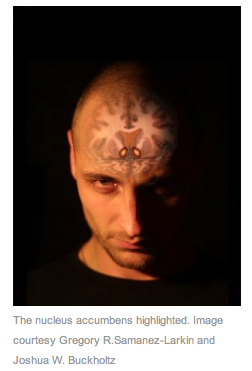This is interesting. However, the conclusion that "individuals with antisocial personality disorder may not be unaware of… consequences… but instead that their intense reward-seeking motivation consumes their attention wholly until they have fulfilled their desire for reward" seems overstated, and only a small piece of the psychopath puzzle.
For a different perspective, that of a financial writer, and an even farther-fetched conclusion, read the second article below. The same data can be interpreted to show that a trader taking on excessive risk is "hopped up on dopamine" so they can’t see negative consequences, making them "kind of a psychopath." Take all this with a grain of salt haloperidol. – Ilene
Driven toward reward without regard for consequence
Courtesy of TIME, by Tiffany O’Callaghan
 An overactive dopamine reward system in the brain may help explain why psychopaths pursue rewards without regard for consequences, according to new research published this week in the journal Nature Neuroscience. Previous research has found that individuals who suffer from antisocial personality disorder—often referred to as sociopathology or psychopathology, despite debate over whether these are distinct conditions—lack empathy and fear. Yet this new study, from researchers at Vanderbilt University examines what these individuals may have in excess. According to the study, led by Joshua Buckholtz, a graduate student in psychology at Vanderbilt, individuals with antisocial personality disorder traits show signs of dysfunction in dopamine reward systems—suggesting that, in psychopaths, the drive toward reward can overwhelm all else.
An overactive dopamine reward system in the brain may help explain why psychopaths pursue rewards without regard for consequences, according to new research published this week in the journal Nature Neuroscience. Previous research has found that individuals who suffer from antisocial personality disorder—often referred to as sociopathology or psychopathology, despite debate over whether these are distinct conditions—lack empathy and fear. Yet this new study, from researchers at Vanderbilt University examines what these individuals may have in excess. According to the study, led by Joshua Buckholtz, a graduate student in psychology at Vanderbilt, individuals with antisocial personality disorder traits show signs of dysfunction in dopamine reward systems—suggesting that, in psychopaths, the drive toward reward can overwhelm all else.
Prior to participating in two different experiments, study subjects completed personality tests to identify presence and severity of psychopathic characteristic—including aggression, lack of empathy, and capacity for manipulation, among other things. Drawing on previous research that has established a strong link between substance abuse and psychopathology, in the first experiment researchers gave participants amphetamine, then used functional Magentic Resonance Imaging (fMRI) brain scans to monitor how dopamine release was affected by the stimulant. In a second experiment, study participants were told that they would be paid for performing a simple task, and researchers conducted brain scans while they completed the tasks.
In both experiments, researchers found that participants who had psychopathic characteristics according to the personality test, were more likely than those without those traits to have greater activity in the nucleus accumbens, the area of the brain associated with dopamine reward processing—whether in response to the chemical stimulant, or the suggestion of monetary reward.
The findings suggest that individuals with antisocial personality disorder may not be unaware of or simply dismissive of consequences, Buckholtz indicates, but instead that their intense reward-seeking motivation consumes their attention wholly until they have fulfilled their desire for reward. These findings may shed light on the violent and criminal behavior often characteristic of psychopaths, and even open doors toward new forms of treatment.
Why Excessive Risk-Takers Are Borderline Psychopaths And Make Horrible Traders
 Courtesy of Courtney Comstock at Clusterstock/Business Insider
Courtesy of Courtney Comstock at Clusterstock/Business Insider
A new study from Vanderbilt University shows that people with psychopathic tendencies (like aggression, lack of empathy, lack of fear) are more prone to take excessive risk without considering the consequences.
During the study, researchers tested people with psychopathic qualities to see how they react to reward.
Very well, it turns out.
Both people with psychopathic qualities and normal people were told they would receive a cash reward for a simple task. Those brains with psychopathic tendencies showed heightened levels of activity in the dopamine reward area of the brain, the nucleus accumbens, as they anticipated receiving the award.
The nucleus accumbens is the part of the brain that is always referred to as the part that blinds traders to excessive risk-taking. Here’s why:
A researcher says, "It’s not just that they don’t appreciate the potential threat, but that the anticipation or motivation for reward overwhelms those concerns."
So if a trader is taking a lot of risk, it’s probably because they are so hopped up on dopamine they can’t see any negative consequences. Oh, and they’re kind of a psychopath.


